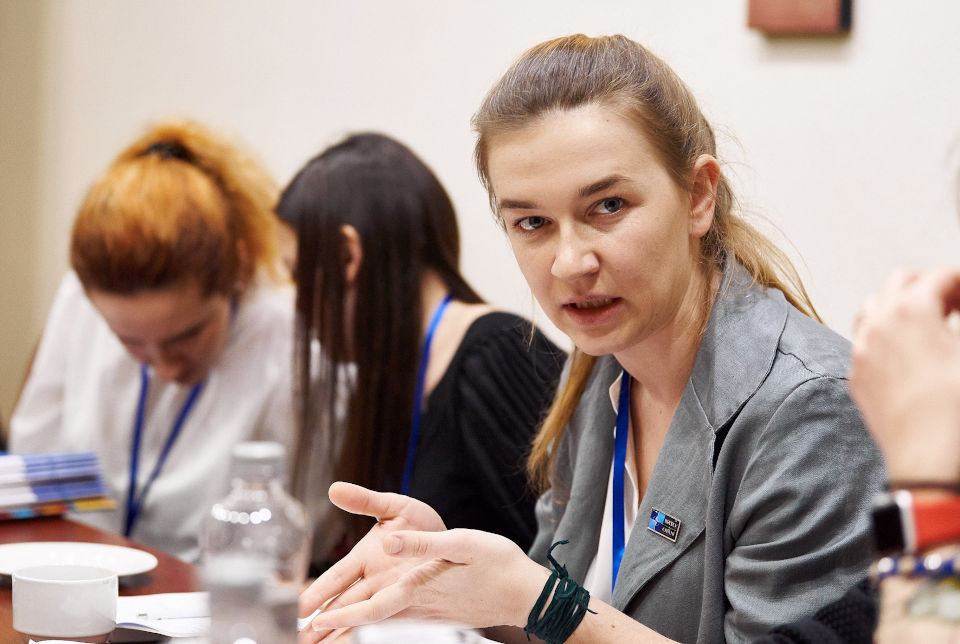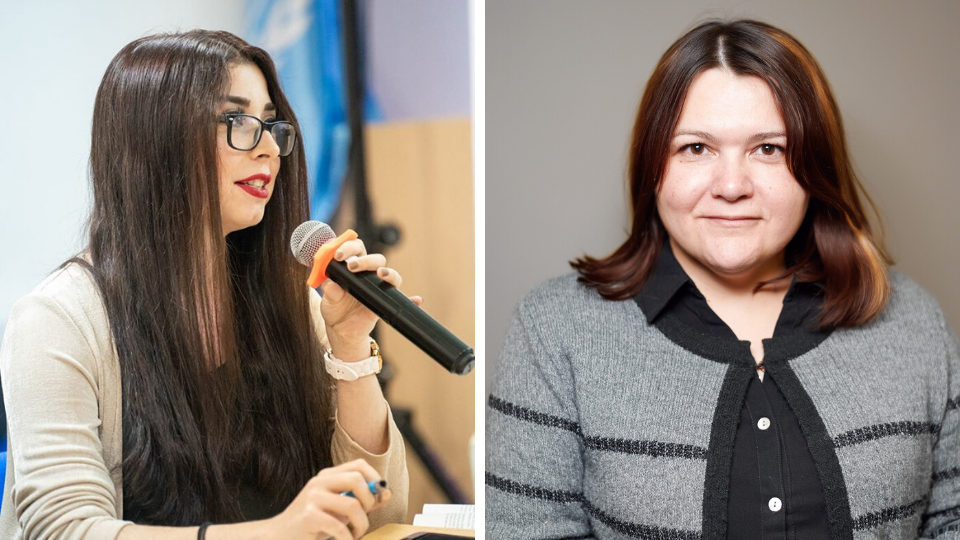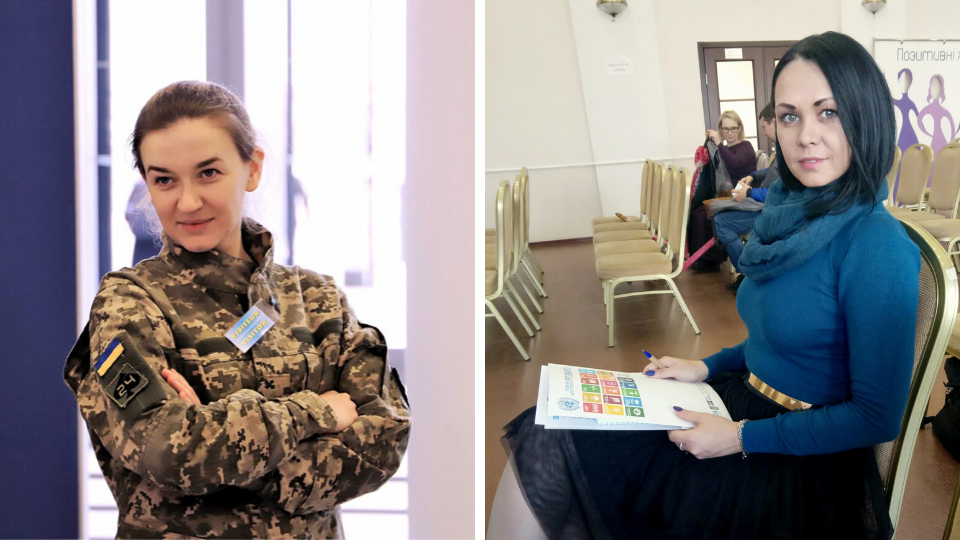Ukrainian women’s voices amid the COVID-19 crisis
Date:

As the unprecedented response to the coronavirus crisis unfolds worldwide, social media feeds and media reports in Ukraine and elsewhere have been filled with images and testimonies of women. After all they form 70 percent of workers in the health and social sectors globally and 82 percent in Ukraine, respectively.
Women are also the backbone of the care economy. The elderly, children in their earliest years, and people with special needs are mostly cared for by women. Low-wage jobs in food stores or on factory floors producing essential protection equipment, which remain open throughout the mandatory lockdowns, are also mostly held by women, placing them again at the forefront of the coronavirus response. Ukrainian women are also doing their share to maintain law and order in these times of global turmoil, even though they are still vastly underrepresented in police and army ranks.
While we celebrate the boost in visibility and the recognition of women’s central role in addressing the coronavirus emergency, it is important to stay vigilant on the many negative effects a pandemic of this scale can have on women’s rights in the short and long term. For example, emerging data shows that, since the coronavirus outbreak, violence against women and girls - particularly domestic violence - across the world has spiked in some cases by more than 30 percent. In Ukraine, reports of domestic violence have doubled.
We are not just living through a public-health crisis, but an economic one likely to affect women disproportionately, given that nearly 60 percent of women around the world work in the informal economy, earning and saving less. This is particularly true for women and girls from minority backgrounds and those with disabilities.
In this context we are featuring the diverse voices of women in Ukraine, especially those from the most vulnerable groups, to hear and relay their stories and their efforts to help others, whether in confinement or not.
Women living with disabilities bear the brunt of lockdowns and exclusion from decision making
In normal times, access to basic services, including health care or Internet, can be a challenge for most people living with a disability (PLWDs) in Ukraine. But now, with people forced into confinement due to the coronavirus, this is exacerbated. “Relatives who may be quarantined in other regions are no longer available to provide the usual support,” says Tetiana Barantsova, a member of Ukraine’s National Assembly of People with Disabilities. “The few nearby shops that may still be open are unlikely to be set-up for PLWDs to even be able to access them.”
There are approximately 2.8 million PLWDs in Ukraine, more than 1 million of whom are women of working age. Only a third of them have a job, and all others are in need of employment. With a disability herself and confined in her home, Tetiana is doing everything she can to stay in contact with her community. She is determined to help them deal with the growing levels of stress and to make sure they get the much-needed information about this fast evolving pandemic and the measures in place.
In rural areas across the country, where there are even fewer clinics and almost no testing capacity for infectious diseases, the vulnerability of PLWDs deepens. Valentyna Dobrydina heads the Assembly for PLWDs in Ukraine’s Chernivtsi region for an organization called “Leader”. A wheelchair user herself, Valentyna is advocating for women with disabilities across rural Ukraine to be protected. Recalling the provisions in the Convention on the Rights of People Living with Disabilities, she says: “It is very important to involve women living with a disability in all the decisions that are being made, especially in these times of emergency.”
 It is very important to involve women living with a disability in all the decisions that are being made, especially in these times of emergency.”
It is very important to involve women living with a disability in all the decisions that are being made, especially in these times of emergency.”
— Valentyna Dobrydina
HIV positive women are at risk of missing vital treatment and of increased violence at home
HIV/AIDS antiretroviral treatment (ART) regimes are rigid. Skipping doses can increase a person’s viral load and “can contribute to the development of drug resistance,” says Oksana Pchelnikova, the Odessa Regional Coordinator of the organization Positive Women. But accessing the few AIDS Centres available in the area to pick up medication and receive counselling can be challenging these days with the confinement measures in place. “Most of our users can’t even get a taxi or reach our centre by foot”. To make things worse, alternative online support isn’t an option as many women living with HIV have no smartphones or computers. “They are left at home in limbo with their children and often with abusive partners who don’t manage the amount of alcohol they consume,” says Oksana.
A study conducted two years ago revealed that across the country, 35 percent of women living with HIV had experienced violence from a partner or husband since the age of 15. Olena Shepeleva runs Kyyanka+, a support group for women living with HIV. Since the coronavirus lockdown she has seen the women she usually helps lose their jobs and become increasingly aware of their vulnerability. “This situation is increasing their anxiety. In addition to access to their regular treatment, they need protection,” she says.
As markets shutdown, Roma women face economic stress and more stigma
With the world’s economy stalled as well as businesses shut down across the country, Ukraine’s emerging economy is already feeling the blow. “What is happening [due to the coronavirus] is powerful and no one can see a clear picture of tomorrow,” says Roma activist, Halyna Yurchenko. “But for Roma women dependent on their daily earnings in markets, trains and cafes, it is even worse as they have little to no chance of finding alternative livelihoods.”
 For Roma women dependent on their daily earnings in markets, trains and cafes, it [the anxiety] is even worse as they have little to no chance of finding alternative livelihoods.”
For Roma women dependent on their daily earnings in markets, trains and cafes, it [the anxiety] is even worse as they have little to no chance of finding alternative livelihoods.”
— Halyna Yurchenko
Ukraine’s Roma minority have a long history of discrimination affecting women and children. Many communities live in overcrowded housing or in isolated settlements with little access to healthcare, clean water, sanitary facilities and food supplies. As COVID-19 spreads across the country so does fear, which is fuelling the stigmatization of Roma people. “Nowadays Roma are also considered as potential spreaders of the virus,” explains Halyna who is helping Roma NGOs mobilize much-needed humanitarian assistance and information to be delivered to Roma families in the settlements.
A call for help for women veterans and those serving in Ukraine’s army
“This pandemic is presenting new economic challenges for women veterans, particularly those who have chronic illnesses or a disability as a result of combat,” says veteran Andriana Susak, representing Ukraine’s Women Veteran Movement, a group formed by female veterans to advocate for the rights of women who had served or still serve in the army. “Many are on their own taking care of their children and their elderly parents and in need of the basics such as food and medicines.”
 This pandemic is presenting new economic challenges for women veterans, particularly those who have chronic illnesses or a disability as a result of combat.”
This pandemic is presenting new economic challenges for women veterans, particularly those who have chronic illnesses or a disability as a result of combat.”
— Andriana Susak
Some 54,000 women served in the Ukrainian armed forces in 2017 but only 6,282 have “combatant status”. Forced to use military equipment made for men, such as heavy packs, women are vulnerable to suffering chronic back problems that are rarely addressed. Often designated as seamstresses and cooks, women veterans become ineligible for combatant health benefits or any recovery and transition support.
But Andriana isn’t only thinking about women veterans like herself. She is deeply concerned about the women still serving in Ukraine’s army, exposed to crowds of people and unable to self-isolate. She is also worried about the many women paramedics who are the majority of medical personnel in the frontlines of fighting the pandemic. “They have no means to protect themselves and they need to be given the necessary equipment including gloves and antiseptics.”

